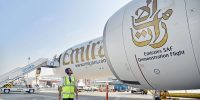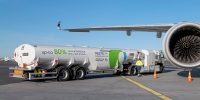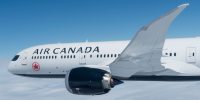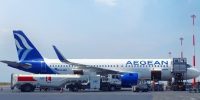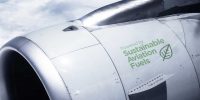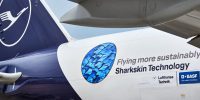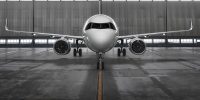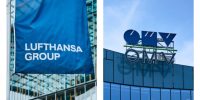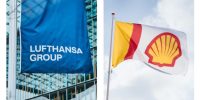The Lufthansa Group and the global energy and chemicals group OMV have signed a Memorandum of Understanding (MoU) for the supply of more than 800,000 tons of SAF for the years 2023 to 2030. The companies intend to expand their existing partnership by adding new locations for SAF production and offtake as well as new technologies. OMV has already been supplying SAF to the Lufthansa Group airline Austrian Airlines at Vienna International Airport since March 2022.
With the expansion of the cooperation, the Lufthansa Group can drive the availability, market ramp-up and use of SAF as an essential element for a CO2-neutral future of aviation. The Lufthansa Group is continuously reviewing options for long-term purchase agreements and is already the largest SAF customer in Europe. For OMV, the planned SAF supply partnership with the Lufthansa Group is a further step towards reducing the CO2 intensity of the product portfolio and providing solutions for the sustainable development of the aviation industry.
SAF – the sustainable aviation fuel
SAF is aviation fuel that is produced without the use of fossil energy sources, such as crude oil or natural gas. Various production processes exist and different feedstock are available as energy sources. The current generation of SAF, which saves 80 percent CO2 compared to conventional kerosene, is mainly produced from biogenic residues, for example from used cooking oils. Before being transported to the airport, SAF is currently mixed with fossil kerosene. In the long term, SAF can enable virtually CO2-neutral aviation.
The Lufthansa Group has been involved in SAF research for many years, has built up an extensive network of partnerships and is driving forward the introduction of sustainable next-generation aviation fuels in particular. Special focus is placed on the forward-looking Power-to-Liquid and Sun-to-Liquid technologies, which use renewable energies or solar thermal energy as energy carriers.
A clear strategy for a sustainable future
The Lufthansa Group has set itself ambitious climate protection goals and aims to achieve a neutral CO2 balance by 2050. Already by 2030, the aviation group wants to halve its net CO2 emissions compared to 2019. To this end, the Lufthansa Group is pursuing a clearly defined reduction path, which has been validated by the Science Based Targets Initiative (SBTi) in August 2022. This makes the Lufthansa Group the first aviation group in Europe with a scientifically based CO2 reduction target in line with the goals of the Paris Climate Agreement of 2015.
For effective climate protection, the Lufthansa Group focuses in particular on accelerated fleet modernization, the continuous optimization of flight operations, the use of Sustainable Aviation Fuels, and innovative offers for its customers to make a flight or the transport of cargo CO2-neutral.
The Lufthansa Group is an aviation group with operations worldwide. With 105,290 employees, the Lufthansa Group generated revenue of EUR 16,811m in the financial year 2021. The Lufthansa Group is composed of the segments Network Airlines, Eurowings and Aviation Services. Aviation Services comprises the segments Logistics, MRO, Catering and Additional Businesses and Group Functions. The latter also include Lufthansa AirPlus, Lufthansa Aviation Training and the IT companies. All segments occupy a leading position in their respective markets.
The Lufthansa Group is an aviation company with operations worldwide. It plays a leading role in its European home market. With 105,290 employees, the Lufthansa Group generated revenue of EUR 16,811m in the financial year 2021.
The Lufthansa Group is composed of the segments Network Airlines, Eurowings and the Aviation Services. The Network Airlines segment comprises Lufthansa German Airlines, SWISS, Austrian Airlines and Brussels Airlines. Lufthansa German Airlines also includes regional airlines Lufthansa CityLine and Air Dolomiti as well as Eurowings Discover, the new holiday airline from the Lufthansa Group which started operations in July 2021 and focuses on the touristic segment. Eurowings focuses on short-haul traffic in European point-to-point traffic. Aviation Services particularly includes the Logistics, MRO and Catering segments. The Lufthansa Group also includes the Additional Businesses and Group Functions. This business segment includes in particular Lufthansa AirPlus, Lufthansa Aviation Training and Lufthansa Systems.
The Lufthansa group has committed itself to reduce its carbon footprint to 50% by 2030 and 0% by 2050
With Group sales of EUR 36 bn and 22,400 employees*, OMV is Austria’s largest listed industrial company. As a global energy and chemicals company, we intend to become a leading provider of sustainable fuels, chemicals and materials by 2030 with a focus on circular economy solutions – and deliver on our pledge to reach net zero by 2050.
The information on this page may have been provided by a contributor and no guarantees can be made about the accuracy of any content. Contributors must obtain all necessary licenses and/or ownership rights from the relevant content owner(s) before submitting the same for publication. AIRLINE PARTNERSHIP disclaims all liability arising from the publication of content received from contributors. Links to third party sites shall not be considered an endorsement by AIRLINE PARTNERSHIP. Please refer to our Disclaimer for more details.

The Lufthansa Group and the global energy and chemicals group OMV have signed a Memorandum of Understanding (MoU) for the supply of more than 800,000 tons of SAF for the years 2023 to 2030. The companies intend to expand their existing partnership by adding new locations for SAF production and offtake as well as new technologies. OMV has already been supplying SAF to the Lufthansa Group airline Austrian Airlines at Vienna International Airport since March 2022.
With the expansion of the cooperation, the Lufthansa Group can drive the availability, market ramp-up and use of SAF as an essential element for a CO2-neutral future of aviation. The Lufthansa Group is continuously reviewing options for long-term purchase agreements and is already the largest SAF customer in Europe. For OMV, the planned SAF supply partnership with the Lufthansa Group is a further step towards reducing the CO2 intensity of the product portfolio and providing solutions for the sustainable development of the aviation industry.
SAF – the sustainable aviation fuel
SAF is aviation fuel that is produced without the use of fossil energy sources, such as crude oil or natural gas. Various production processes exist and different feedstock are available as energy sources. The current generation of SAF, which saves 80 percent CO2 compared to conventional kerosene, is mainly produced from biogenic residues, for example from used cooking oils. Before being transported to the airport, SAF is currently mixed with fossil kerosene. In the long term, SAF can enable virtually CO2-neutral aviation.
The Lufthansa Group has been involved in SAF research for many years, has built up an extensive network of partnerships and is driving forward the introduction of sustainable next-generation aviation fuels in particular. Special focus is placed on the forward-looking Power-to-Liquid and Sun-to-Liquid technologies, which use renewable energies or solar thermal energy as energy carriers.
A clear strategy for a sustainable future
The Lufthansa Group has set itself ambitious climate protection goals and aims to achieve a neutral CO2 balance by 2050. Already by 2030, the aviation group wants to halve its net CO2 emissions compared to 2019. To this end, the Lufthansa Group is pursuing a clearly defined reduction path, which has been validated by the Science Based Targets Initiative (SBTi) in August 2022. This makes the Lufthansa Group the first aviation group in Europe with a scientifically based CO2 reduction target in line with the goals of the Paris Climate Agreement of 2015.
For effective climate protection, the Lufthansa Group focuses in particular on accelerated fleet modernization, the continuous optimization of flight operations, the use of Sustainable Aviation Fuels, and innovative offers for its customers to make a flight or the transport of cargo CO2-neutral.
The Lufthansa Group is an aviation group with operations worldwide. With 105,290 employees, the Lufthansa Group generated revenue of EUR 16,811m in the financial year 2021. The Lufthansa Group is composed of the segments Network Airlines, Eurowings and Aviation Services. Aviation Services comprises the segments Logistics, MRO, Catering and Additional Businesses and Group Functions. The latter also include Lufthansa AirPlus, Lufthansa Aviation Training and the IT companies. All segments occupy a leading position in their respective markets.
The Lufthansa Group is an aviation company with operations worldwide. It plays a leading role in its European home market. With 105,290 employees, the Lufthansa Group generated revenue of EUR 16,811m in the financial year 2021.
The Lufthansa Group is composed of the segments Network Airlines, Eurowings and the Aviation Services. The Network Airlines segment comprises Lufthansa German Airlines, SWISS, Austrian Airlines and Brussels Airlines. Lufthansa German Airlines also includes regional airlines Lufthansa CityLine and Air Dolomiti as well as Eurowings Discover, the new holiday airline from the Lufthansa Group which started operations in July 2021 and focuses on the touristic segment. Eurowings focuses on short-haul traffic in European point-to-point traffic. Aviation Services particularly includes the Logistics, MRO and Catering segments. The Lufthansa Group also includes the Additional Businesses and Group Functions. This business segment includes in particular Lufthansa AirPlus, Lufthansa Aviation Training and Lufthansa Systems.
The Lufthansa group has committed itself to reduce its carbon footprint to 50% by 2030 and 0% by 2050
With Group sales of EUR 36 bn and 22,400 employees*, OMV is Austria’s largest listed industrial company. As a global energy and chemicals company, we intend to become a leading provider of sustainable fuels, chemicals and materials by 2030 with a focus on circular economy solutions – and deliver on our pledge to reach net zero by 2050.
The information on this page may have been provided by a contributor and no guarantees can be made about the accuracy of any content. Contributors must obtain all necessary licenses and/or ownership rights from the relevant content owner(s) before submitting the same for publication. AIRLINE PARTNERSHIP disclaims all liability arising from the publication of content received from contributors. Links to third party sites shall not be considered an endorsement by AIRLINE PARTNERSHIP. Please refer to our Disclaimer for more details.
The Lufthansa Group and the global energy and chemicals group OMV have signed a Memorandum of Understanding (MoU) for the supply of more than 800,000 tons of SAF for the years 2023 to 2030. The companies intend to expand their existing partnership by adding new locations for SAF production and offtake as well as new technologies. OMV has already been supplying SAF to the Lufthansa Group airline Austrian Airlines at Vienna International Airport since March 2022.
With the expansion of the cooperation, the Lufthansa Group can drive the availability, market ramp-up and use of SAF as an essential element for a CO2-neutral future of aviation. The Lufthansa Group is continuously reviewing options for long-term purchase agreements and is already the largest SAF customer in Europe. For OMV, the planned SAF supply partnership with the Lufthansa Group is a further step towards reducing the CO2 intensity of the product portfolio and providing solutions for the sustainable development of the aviation industry.
SAF – the sustainable aviation fuel
SAF is aviation fuel that is produced without the use of fossil energy sources, such as crude oil or natural gas. Various production processes exist and different feedstock are available as energy sources. The current generation of SAF, which saves 80 percent CO2 compared to conventional kerosene, is mainly produced from biogenic residues, for example from used cooking oils. Before being transported to the airport, SAF is currently mixed with fossil kerosene. In the long term, SAF can enable virtually CO2-neutral aviation.
The Lufthansa Group has been involved in SAF research for many years, has built up an extensive network of partnerships and is driving forward the introduction of sustainable next-generation aviation fuels in particular. Special focus is placed on the forward-looking Power-to-Liquid and Sun-to-Liquid technologies, which use renewable energies or solar thermal energy as energy carriers.
A clear strategy for a sustainable future
The Lufthansa Group has set itself ambitious climate protection goals and aims to achieve a neutral CO2 balance by 2050. Already by 2030, the aviation group wants to halve its net CO2 emissions compared to 2019. To this end, the Lufthansa Group is pursuing a clearly defined reduction path, which has been validated by the Science Based Targets Initiative (SBTi) in August 2022. This makes the Lufthansa Group the first aviation group in Europe with a scientifically based CO2 reduction target in line with the goals of the Paris Climate Agreement of 2015.
For effective climate protection, the Lufthansa Group focuses in particular on accelerated fleet modernization, the continuous optimization of flight operations, the use of Sustainable Aviation Fuels, and innovative offers for its customers to make a flight or the transport of cargo CO2-neutral.
The Lufthansa Group is an aviation group with operations worldwide. With 105,290 employees, the Lufthansa Group generated revenue of EUR 16,811m in the financial year 2021. The Lufthansa Group is composed of the segments Network Airlines, Eurowings and Aviation Services. Aviation Services comprises the segments Logistics, MRO, Catering and Additional Businesses and Group Functions. The latter also include Lufthansa AirPlus, Lufthansa Aviation Training and the IT companies. All segments occupy a leading position in their respective markets.
The Lufthansa Group is an aviation company with operations worldwide. It plays a leading role in its European home market. With 105,290 employees, the Lufthansa Group generated revenue of EUR 16,811m in the financial year 2021.
The Lufthansa Group is composed of the segments Network Airlines, Eurowings and the Aviation Services. The Network Airlines segment comprises Lufthansa German Airlines, SWISS, Austrian Airlines and Brussels Airlines. Lufthansa German Airlines also includes regional airlines Lufthansa CityLine and Air Dolomiti as well as Eurowings Discover, the new holiday airline from the Lufthansa Group which started operations in July 2021 and focuses on the touristic segment. Eurowings focuses on short-haul traffic in European point-to-point traffic. Aviation Services particularly includes the Logistics, MRO and Catering segments. The Lufthansa Group also includes the Additional Businesses and Group Functions. This business segment includes in particular Lufthansa AirPlus, Lufthansa Aviation Training and Lufthansa Systems.
The Lufthansa group has committed itself to reduce its carbon footprint to 50% by 2030 and 0% by 2050
With Group sales of EUR 36 bn and 22,400 employees*, OMV is Austria’s largest listed industrial company. As a global energy and chemicals company, we intend to become a leading provider of sustainable fuels, chemicals and materials by 2030 with a focus on circular economy solutions – and deliver on our pledge to reach net zero by 2050.
The information on this page may have been provided by a contributor and no guarantees can be made about the accuracy of any content. Contributors must obtain all necessary licenses and/or ownership rights from the relevant content owner(s) before submitting the same for publication. AIRLINE PARTNERSHIP disclaims all liability arising from the publication of content received from contributors. Links to third party sites shall not be considered an endorsement by AIRLINE PARTNERSHIP. Please refer to our Disclaimer for more details.
The Lufthansa Group and the global energy and chemicals group OMV have signed a Memorandum of Understanding (MoU) for the supply of more than 800,000 tons of SAF for the years 2023 to 2030. The companies intend to expand their existing partnership by adding new locations for SAF production and offtake as well as new technologies. OMV has already been supplying SAF to the Lufthansa Group airline Austrian Airlines at Vienna International Airport since March 2022.
With the expansion of the cooperation, the Lufthansa Group can drive the availability, market ramp-up and use of SAF as an essential element for a CO2-neutral future of aviation. The Lufthansa Group is continuously reviewing options for long-term purchase agreements and is already the largest SAF customer in Europe. For OMV, the planned SAF supply partnership with the Lufthansa Group is a further step towards reducing the CO2 intensity of the product portfolio and providing solutions for the sustainable development of the aviation industry.
SAF – the sustainable aviation fuel
SAF is aviation fuel that is produced without the use of fossil energy sources, such as crude oil or natural gas. Various production processes exist and different feedstock are available as energy sources. The current generation of SAF, which saves 80 percent CO2 compared to conventional kerosene, is mainly produced from biogenic residues, for example from used cooking oils. Before being transported to the airport, SAF is currently mixed with fossil kerosene. In the long term, SAF can enable virtually CO2-neutral aviation.
The Lufthansa Group has been involved in SAF research for many years, has built up an extensive network of partnerships and is driving forward the introduction of sustainable next-generation aviation fuels in particular. Special focus is placed on the forward-looking Power-to-Liquid and Sun-to-Liquid technologies, which use renewable energies or solar thermal energy as energy carriers.
A clear strategy for a sustainable future
The Lufthansa Group has set itself ambitious climate protection goals and aims to achieve a neutral CO2 balance by 2050. Already by 2030, the aviation group wants to halve its net CO2 emissions compared to 2019. To this end, the Lufthansa Group is pursuing a clearly defined reduction path, which has been validated by the Science Based Targets Initiative (SBTi) in August 2022. This makes the Lufthansa Group the first aviation group in Europe with a scientifically based CO2 reduction target in line with the goals of the Paris Climate Agreement of 2015.
For effective climate protection, the Lufthansa Group focuses in particular on accelerated fleet modernization, the continuous optimization of flight operations, the use of Sustainable Aviation Fuels, and innovative offers for its customers to make a flight or the transport of cargo CO2-neutral.
The Lufthansa Group is an aviation group with operations worldwide. With 105,290 employees, the Lufthansa Group generated revenue of EUR 16,811m in the financial year 2021. The Lufthansa Group is composed of the segments Network Airlines, Eurowings and Aviation Services. Aviation Services comprises the segments Logistics, MRO, Catering and Additional Businesses and Group Functions. The latter also include Lufthansa AirPlus, Lufthansa Aviation Training and the IT companies. All segments occupy a leading position in their respective markets.
The Lufthansa Group is an aviation company with operations worldwide. It plays a leading role in its European home market. With 105,290 employees, the Lufthansa Group generated revenue of EUR 16,811m in the financial year 2021.
The Lufthansa Group is composed of the segments Network Airlines, Eurowings and the Aviation Services. The Network Airlines segment comprises Lufthansa German Airlines, SWISS, Austrian Airlines and Brussels Airlines. Lufthansa German Airlines also includes regional airlines Lufthansa CityLine and Air Dolomiti as well as Eurowings Discover, the new holiday airline from the Lufthansa Group which started operations in July 2021 and focuses on the touristic segment. Eurowings focuses on short-haul traffic in European point-to-point traffic. Aviation Services particularly includes the Logistics, MRO and Catering segments. The Lufthansa Group also includes the Additional Businesses and Group Functions. This business segment includes in particular Lufthansa AirPlus, Lufthansa Aviation Training and Lufthansa Systems.
The Lufthansa group has committed itself to reduce its carbon footprint to 50% by 2030 and 0% by 2050
With Group sales of EUR 36 bn and 22,400 employees*, OMV is Austria’s largest listed industrial company. As a global energy and chemicals company, we intend to become a leading provider of sustainable fuels, chemicals and materials by 2030 with a focus on circular economy solutions – and deliver on our pledge to reach net zero by 2050.
The information on this page may have been provided by a contributor and no guarantees can be made about the accuracy of any content. Contributors must obtain all necessary licenses and/or ownership rights from the relevant content owner(s) before submitting the same for publication. AIRLINE PARTNERSHIP disclaims all liability arising from the publication of content received from contributors. Links to third party sites shall not be considered an endorsement by AIRLINE PARTNERSHIP. Please refer to our Disclaimer for more details.

The Lufthansa Group and the global energy and chemicals group OMV have signed a Memorandum of Understanding (MoU) for the supply of more than 800,000 tons of SAF for the years 2023 to 2030. The companies intend to expand their existing partnership by adding new locations for SAF production and offtake as well as new technologies. OMV has already been supplying SAF to the Lufthansa Group airline Austrian Airlines at Vienna International Airport since March 2022.
With the expansion of the cooperation, the Lufthansa Group can drive the availability, market ramp-up and use of SAF as an essential element for a CO2-neutral future of aviation. The Lufthansa Group is continuously reviewing options for long-term purchase agreements and is already the largest SAF customer in Europe. For OMV, the planned SAF supply partnership with the Lufthansa Group is a further step towards reducing the CO2 intensity of the product portfolio and providing solutions for the sustainable development of the aviation industry.
SAF – the sustainable aviation fuel
SAF is aviation fuel that is produced without the use of fossil energy sources, such as crude oil or natural gas. Various production processes exist and different feedstock are available as energy sources. The current generation of SAF, which saves 80 percent CO2 compared to conventional kerosene, is mainly produced from biogenic residues, for example from used cooking oils. Before being transported to the airport, SAF is currently mixed with fossil kerosene. In the long term, SAF can enable virtually CO2-neutral aviation.
The Lufthansa Group has been involved in SAF research for many years, has built up an extensive network of partnerships and is driving forward the introduction of sustainable next-generation aviation fuels in particular. Special focus is placed on the forward-looking Power-to-Liquid and Sun-to-Liquid technologies, which use renewable energies or solar thermal energy as energy carriers.
A clear strategy for a sustainable future
The Lufthansa Group has set itself ambitious climate protection goals and aims to achieve a neutral CO2 balance by 2050. Already by 2030, the aviation group wants to halve its net CO2 emissions compared to 2019. To this end, the Lufthansa Group is pursuing a clearly defined reduction path, which has been validated by the Science Based Targets Initiative (SBTi) in August 2022. This makes the Lufthansa Group the first aviation group in Europe with a scientifically based CO2 reduction target in line with the goals of the Paris Climate Agreement of 2015.
For effective climate protection, the Lufthansa Group focuses in particular on accelerated fleet modernization, the continuous optimization of flight operations, the use of Sustainable Aviation Fuels, and innovative offers for its customers to make a flight or the transport of cargo CO2-neutral.
The Lufthansa Group is an aviation group with operations worldwide. With 105,290 employees, the Lufthansa Group generated revenue of EUR 16,811m in the financial year 2021. The Lufthansa Group is composed of the segments Network Airlines, Eurowings and Aviation Services. Aviation Services comprises the segments Logistics, MRO, Catering and Additional Businesses and Group Functions. The latter also include Lufthansa AirPlus, Lufthansa Aviation Training and the IT companies. All segments occupy a leading position in their respective markets.
The Lufthansa Group is an aviation company with operations worldwide. It plays a leading role in its European home market. With 105,290 employees, the Lufthansa Group generated revenue of EUR 16,811m in the financial year 2021.
The Lufthansa Group is composed of the segments Network Airlines, Eurowings and the Aviation Services. The Network Airlines segment comprises Lufthansa German Airlines, SWISS, Austrian Airlines and Brussels Airlines. Lufthansa German Airlines also includes regional airlines Lufthansa CityLine and Air Dolomiti as well as Eurowings Discover, the new holiday airline from the Lufthansa Group which started operations in July 2021 and focuses on the touristic segment. Eurowings focuses on short-haul traffic in European point-to-point traffic. Aviation Services particularly includes the Logistics, MRO and Catering segments. The Lufthansa Group also includes the Additional Businesses and Group Functions. This business segment includes in particular Lufthansa AirPlus, Lufthansa Aviation Training and Lufthansa Systems.
The Lufthansa group has committed itself to reduce its carbon footprint to 50% by 2030 and 0% by 2050
With Group sales of EUR 36 bn and 22,400 employees*, OMV is Austria’s largest listed industrial company. As a global energy and chemicals company, we intend to become a leading provider of sustainable fuels, chemicals and materials by 2030 with a focus on circular economy solutions – and deliver on our pledge to reach net zero by 2050.
The information on this page may have been provided by a contributor and no guarantees can be made about the accuracy of any content. Contributors must obtain all necessary licenses and/or ownership rights from the relevant content owner(s) before submitting the same for publication. AIRLINE PARTNERSHIP disclaims all liability arising from the publication of content received from contributors. Links to third party sites shall not be considered an endorsement by AIRLINE PARTNERSHIP. Please refer to our Disclaimer for more details.
The Lufthansa Group and the global energy and chemicals group OMV have signed a Memorandum of Understanding (MoU) for the supply of more than 800,000 tons of SAF for the years 2023 to 2030. The companies intend to expand their existing partnership by adding new locations for SAF production and offtake as well as new technologies. OMV has already been supplying SAF to the Lufthansa Group airline Austrian Airlines at Vienna International Airport since March 2022.
With the expansion of the cooperation, the Lufthansa Group can drive the availability, market ramp-up and use of SAF as an essential element for a CO2-neutral future of aviation. The Lufthansa Group is continuously reviewing options for long-term purchase agreements and is already the largest SAF customer in Europe. For OMV, the planned SAF supply partnership with the Lufthansa Group is a further step towards reducing the CO2 intensity of the product portfolio and providing solutions for the sustainable development of the aviation industry.
SAF – the sustainable aviation fuel
SAF is aviation fuel that is produced without the use of fossil energy sources, such as crude oil or natural gas. Various production processes exist and different feedstock are available as energy sources. The current generation of SAF, which saves 80 percent CO2 compared to conventional kerosene, is mainly produced from biogenic residues, for example from used cooking oils. Before being transported to the airport, SAF is currently mixed with fossil kerosene. In the long term, SAF can enable virtually CO2-neutral aviation.
The Lufthansa Group has been involved in SAF research for many years, has built up an extensive network of partnerships and is driving forward the introduction of sustainable next-generation aviation fuels in particular. Special focus is placed on the forward-looking Power-to-Liquid and Sun-to-Liquid technologies, which use renewable energies or solar thermal energy as energy carriers.
A clear strategy for a sustainable future
The Lufthansa Group has set itself ambitious climate protection goals and aims to achieve a neutral CO2 balance by 2050. Already by 2030, the aviation group wants to halve its net CO2 emissions compared to 2019. To this end, the Lufthansa Group is pursuing a clearly defined reduction path, which has been validated by the Science Based Targets Initiative (SBTi) in August 2022. This makes the Lufthansa Group the first aviation group in Europe with a scientifically based CO2 reduction target in line with the goals of the Paris Climate Agreement of 2015.
For effective climate protection, the Lufthansa Group focuses in particular on accelerated fleet modernization, the continuous optimization of flight operations, the use of Sustainable Aviation Fuels, and innovative offers for its customers to make a flight or the transport of cargo CO2-neutral.
The Lufthansa Group is an aviation group with operations worldwide. With 105,290 employees, the Lufthansa Group generated revenue of EUR 16,811m in the financial year 2021. The Lufthansa Group is composed of the segments Network Airlines, Eurowings and Aviation Services. Aviation Services comprises the segments Logistics, MRO, Catering and Additional Businesses and Group Functions. The latter also include Lufthansa AirPlus, Lufthansa Aviation Training and the IT companies. All segments occupy a leading position in their respective markets.
The Lufthansa Group is an aviation company with operations worldwide. It plays a leading role in its European home market. With 105,290 employees, the Lufthansa Group generated revenue of EUR 16,811m in the financial year 2021.
The Lufthansa Group is composed of the segments Network Airlines, Eurowings and the Aviation Services. The Network Airlines segment comprises Lufthansa German Airlines, SWISS, Austrian Airlines and Brussels Airlines. Lufthansa German Airlines also includes regional airlines Lufthansa CityLine and Air Dolomiti as well as Eurowings Discover, the new holiday airline from the Lufthansa Group which started operations in July 2021 and focuses on the touristic segment. Eurowings focuses on short-haul traffic in European point-to-point traffic. Aviation Services particularly includes the Logistics, MRO and Catering segments. The Lufthansa Group also includes the Additional Businesses and Group Functions. This business segment includes in particular Lufthansa AirPlus, Lufthansa Aviation Training and Lufthansa Systems.
The Lufthansa group has committed itself to reduce its carbon footprint to 50% by 2030 and 0% by 2050
With Group sales of EUR 36 bn and 22,400 employees*, OMV is Austria’s largest listed industrial company. As a global energy and chemicals company, we intend to become a leading provider of sustainable fuels, chemicals and materials by 2030 with a focus on circular economy solutions – and deliver on our pledge to reach net zero by 2050.
The information on this page may have been provided by a contributor and no guarantees can be made about the accuracy of any content. Contributors must obtain all necessary licenses and/or ownership rights from the relevant content owner(s) before submitting the same for publication. AIRLINE PARTNERSHIP disclaims all liability arising from the publication of content received from contributors. Links to third party sites shall not be considered an endorsement by AIRLINE PARTNERSHIP. Please refer to our Disclaimer for more details.


